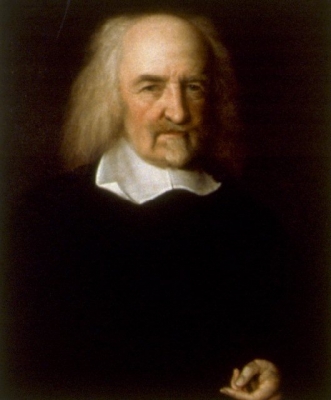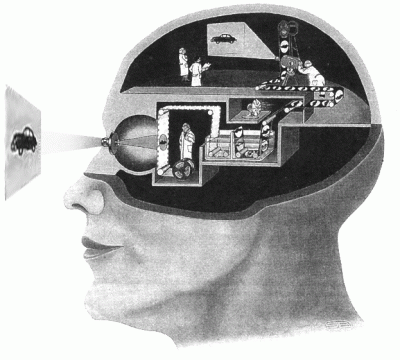


15 + 30 points
The First Amendment by Hobbes, Herbie Hatman, Locke, St. Aquinas, Descarte
April 17th, 2008 8:00 PM
Cogito ergo sum.
My first intention was to simply write that statement and leave it at that. You see this task is an interesting one from a philosophical standpoint.
Let's deal with the title first; "The First Ammendment [sic]".
Congress shall make no law respecting an establishment of religion,
or prohibiting the free exercise thereof; or abridging the freedom of
speech, or of the press; or the right of the people peaceably to
assemble, and to petition the government for a redress of grievances.
Reader, please note that the first amendment does not deal with natural rights, but rather restrictions placed on the congress.
It is the Declaration of Independence which speaks of natural rights when it says:
We hold these truths to be self-evident, that all men are created
equal, that they are endowed by their Creator with certain unalienable
Rights, that among these are Life, Liberty and the pursuit of Happiness.
Jefferson pretty much plagarized this from Locke. Locke says that Life, Liberty, and Property are our natural rights.
But Natural Rights are much older than Jefferson, Paine, Hobbes, Locke, or Grotius, or Aquinas.
The Greeks were the first on record to have the notion.
Jonathan Dolhenty, Ph.D says:
The idea began with the ancient Greeks'
conception of a universe governed in every
particular by an eternal, immutable law and in
their distinction between what is just by nature
and just by convention.
Stoicism provided the most
complete classical formulation of natural law. The
Stoics argued that the universe is governed by
reason, or rational principle; they further argued
that all humans have reason within them and can
therefore know and obey its law. Because human
beings have the faculty of choice (a free will),
they will not necessarily obey the law; if they act
in accordance with reason, however, they will be
"following nature."
So this brings us back to the beginning.
Reasoning.
And life.
Descartes says that the only proof for existence is that one is thinking. The good old "Cogito ergo sum". So by saying that little phrase you'll see that I'm acting in accordance to reason, and proving that I am alive. Which under any of the above definitions, is an example of me exercising at least one natural right.
If you even believe that natural rights exist.
One more thing before I end this praxis. Ammendment is normally spelled amendment. I ruminated on this for a little while and came to the conclusion that the author of the task must have been exercising his or her first amendment right to misspell.
So for the record.... I think that eachother is a word. So there.
My first intention was to simply write that statement and leave it at that. You see this task is an interesting one from a philosophical standpoint.
Let's deal with the title first; "The First Ammendment [sic]".
Congress shall make no law respecting an establishment of religion,
or prohibiting the free exercise thereof; or abridging the freedom of
speech, or of the press; or the right of the people peaceably to
assemble, and to petition the government for a redress of grievances.
Reader, please note that the first amendment does not deal with natural rights, but rather restrictions placed on the congress.
It is the Declaration of Independence which speaks of natural rights when it says:
We hold these truths to be self-evident, that all men are created
equal, that they are endowed by their Creator with certain unalienable
Rights, that among these are Life, Liberty and the pursuit of Happiness.
Jefferson pretty much plagarized this from Locke. Locke says that Life, Liberty, and Property are our natural rights.
But Natural Rights are much older than Jefferson, Paine, Hobbes, Locke, or Grotius, or Aquinas.
The Greeks were the first on record to have the notion.
Jonathan Dolhenty, Ph.D says:
The idea began with the ancient Greeks'
conception of a universe governed in every
particular by an eternal, immutable law and in
their distinction between what is just by nature
and just by convention.
Stoicism provided the most
complete classical formulation of natural law. The
Stoics argued that the universe is governed by
reason, or rational principle; they further argued
that all humans have reason within them and can
therefore know and obey its law. Because human
beings have the faculty of choice (a free will),
they will not necessarily obey the law; if they act
in accordance with reason, however, they will be
"following nature."
So this brings us back to the beginning.
Reasoning.
And life.
Descartes says that the only proof for existence is that one is thinking. The good old "Cogito ergo sum". So by saying that little phrase you'll see that I'm acting in accordance to reason, and proving that I am alive. Which under any of the above definitions, is an example of me exercising at least one natural right.
If you even believe that natural rights exist.
One more thing before I end this praxis. Ammendment is normally spelled amendment. I ruminated on this for a little while and came to the conclusion that the author of the task must have been exercising his or her first amendment right to misspell.
So for the record.... I think that eachother is a word. So there.
6 vote(s)
Terms
(none yet)4 comment(s)
 No.
No.
posted by Myrna Minx on April 17th, 2008 8:27 PM
I guess exercising your rights to life, liberty, property, and happiness don't necessarily require that you leave the house...
and that diagram really does it for me. yowza!
posted by Darkaardvark on April 17th, 2008 9:07 PM
Descartes walks into a bar. Barkeep says, "What'll ya have, a martini?" Descartes replies, "No, I think not," and *poof* he's gone.
posted by Burn Unit on April 18th, 2008 1:54 AM
somebody's trying to take control of the crisis... levul seven... and fast!
















